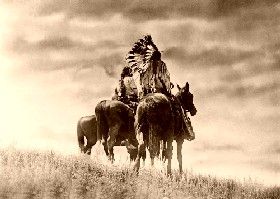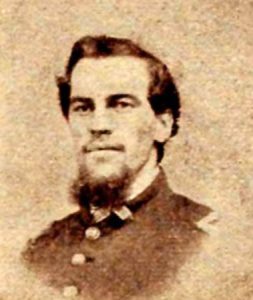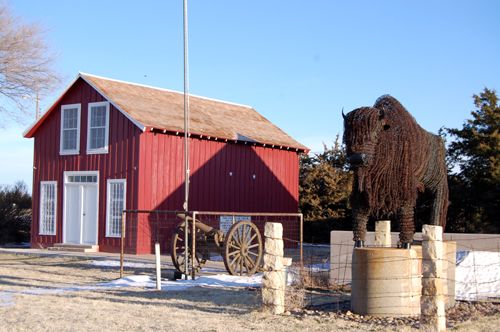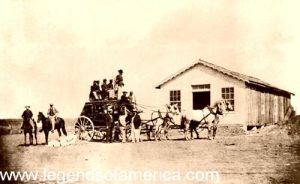By the New York Times, December 26, 1865
Smoky Hill Springs, Kansas, Saturday, November 25, 1865
In my last epistle, I gave an account of the murder of several people along the Smoky Hill Trail and depredations of various kinds by a band of Indians, supposed to be Cheyenne, under the lead of one of their chiefs rejoicing in the soubriquet of “Fast Bear.” The Butterfield Overland Despatch coach, containing General Brewster and several passengers, left Chalk Bluff Station with an escort of cavalry on November 23, 1865, arriving without adventure at Monument Station the same evening. At Monument, there is a military post, so we considered our case a safe one.
A large wagon train with an escort of Infantry was also en route to Pond Creek, a military post some 25 miles west of our present position.
We left Monument yesterday morning to continue our journey to Denver, Colorado, accompanied by an ambulance, in which was Surgeon N.L. Whipple, who had been to Chalk Bluff to care for the soldiers wounded at that place in repelling an attack made by Indians a few days since.
Colonel William Tamblyn seemed to think that there was so little danger that we felt very safe with an escort of eight men, three in the ambulance with the doctor and five mounted men riding in advance of the coach.
We saw no sign of the presence of Indians during the morning and had nearly reached the station when the ambulance driver took a shortcut that did not pass the station but joined the main road a mile beyond it.
When within 1500 yards of the station, Mr. Davis of Harper’s Weekly discovered that a squad of Indians was charging down on us. He immediately gave the alarm and opened on the Indians with his Ballard rifle, which General Brewster, Mr. Hasbrock immediately initiated performance, and Your Own, Mr. Perrin doing duty with his revolver from the outside of the coach.
As all were armed with Ballard guns, we drove the party off quite as fast as they came, two of them bearing tokens of our regard in the shape of curiously shaped cones of lead.
The driver of our coach did not want to pluck but quickly drove his team to the station. We left the coach at once and discovered that another party of Indians had rushed in among the horses and mules grazing near, stampeding them.
One of the stock tenders had started at the first alarm to gather the mules grazing near the station; one of the Indians discovered him and gave chase just after we got out of the coach. Mr. Davis discovered him and started with his rifle to help the stock-tender. The Indian drove an arrow at the herder, fortunately missing him, when a bullet from Mr. Davis’ rifle ended the little performance and the Indian at the same moment.
The stock tender was saved, but the stock was gone, and with it, five horses belonging to the cavalry stationed at this point. The garrison consisted of ten men of the Thirteenth Missouri Cavalry. Five men were away on a buffalo hunt, so they saved their steeds.
We were congratulating ourselves on our escape when we thought of the doctor and his ambulance and saw at the same moment some 15-20 Indians in hot pursuit of the vehicle, which was being rushed along at a tremendous speed by the frightened mules.
The chase was exciting; entirely out of our power to render any assistance. We dispatched our four cavalrymen to help the fugitives if possible. The cavalrymen had gained a little crest a half a mile distant when we saw the men from the ambulance running toward them; then, we knew that they were safe. Thus, the doctor tells the story:
“I had just left you when I thought that it might be a little imprudent but kept on. We were so near the station, and there were no signs of the Indians. But this state of affairs was changed by a number of the red ni**ers coming yelling after us, frightening the mules so that we could not turn them back toward the station. As soon as the scoundrels got near enough, they opened on the ambulance with their revolvers; we were saving our few shots until they were right on us when we fired on them.
This had the desired effect, but only for a short time when after us they came again. Seeing that it was impossible to escape if we did not take this moment, we now left the ambulance and ran toward the four men we saw leave the station to help us.
The Indians at once gave chase and made our run very interesting for a short time. But when we got tired running, we turned on them, fired a few shots at the gentlemen, and they would stop, so would we, but only take a breath and start again. We caught the four men, mounted behind them, and came to the station. That’s the case as near as I remember it,” said the Doctor, “for I was in a slightly mixed state after we left the ambulance.” While this chase was going on, we were watching the Indians. The moment of the first attack seemed a signal for Indians to start from every hillside, and every point of the compass, at the same time. That we were surrounded, there was no doubt. So our next thought was how to defend ourselves from attack.
The soldiers garrisoning the station had dug into the hillside and built a bomb-proof, with a covered way dug around it for a rifle pit. This was to be our fortress and a good one too. Upon the doctor and his squad’s arrival, we numbered 21 persons, variously armed.
If there had been any horses, we could have mounted them and attacked the Indians, and certainly should have done so, when we saw the ambulance driven toward us with a cargo of Indians busily engaged in “going through” its contents. But what could men on foot do with mounted Indians? Certainly not catch them. Then when we moved toward them to get within rifle-shot, they left.
The ambulance was taken into a ravine a little more than a mile from us and set on fire. Simultaneously, some of the red devils set fire to the prairie and nearly succeeded in their effort at burning us out.
A sort of war council was held, and the decision arrived that we could whip the Indians if we kept together. Our anxiety was for the five men out hunting, and a careful watch was kept for them to move toward them if we saw them approaching so that the Indians could not fight them unaided.
The men on the watch soon discovered a small body of mounted men moving toward us, who we were sure were the returning buffalo hunters. But while they were far in the distance, the Indians discovered them and gave chase at once. The small squad that we thought to be our men went scampering off over the hills in the direction of the next station west (Eaton Springs.)
It was now determined to stay by our mud fort until the next day when the government train with its infantry escort would arrive and make it safe to continue with our escort.
Our hole in the hillside was a place of comfort. The roof, composed of boughs of trees and earth, was supported by posts of sufficient strength to ensure that the Indians might ride over the top of our fortification without danger of their coming through. Night coming on, we organized a guard – seven on tour, for four hours’ length.
The first relief consisted of our party, with a soldier in addition. We did not discover the usual plan of walking a beat to be the safest at this place, for Indians will crawl up and are not particularly careful in the use of their arrows; so we took each one his post in such a position as would command the best view of a particular space in his immediate vicinity.
An hour after dark, a whirring noise was heard over our heads; all kept quiet; soon another, and we knew that some prowling scoundrel was driving arrows over our position to discover the whereabouts of our guard. The game did not succeed in discovering our location to Mr. Indian, so they left us to the quiet possession of our “dobe.” The whole garrison was roused just before daylight, and we made ready for an attack, which did not come. Indians have two favorite moments for an attack. Just as day breaks, the white man sleeps the soundest, which the Indian knows. At midday, the white man feels confident in the broad day and is less likely to be on this guard. The Indian takes advantage of this for his sudden attack.
So far as our experience goes, no fear is to be apprehended from Indians unless they can surprise their foe, and this, too, when they outnumber him ten to one. The red-skins are more like wolves than anything else that I can liken them to, cowardly in the extreme when they find that their enemy, no matter how inferior in number, is ready for an attack and willing to fight. They are more wantonly cruel than it would seem possible for a human being to be.
Our sentinel has just given us the information that “a considerable body of something has just come into sight.” Whether they are Indians or our expected train, we cannot tell.
The result of the information is that we are to be in the anxious seat until the party is near enough to discover whether we have a fight on hand or a friend to welcome. The party has arrived, proving to be Captain Musgrove of the First United States Volunteers, with an escort, and Mr. Baker, the Division Agent of the Butterfield Overland Despatch Company. Mr. Baker was within sight of Captain Musgrove’s camp yesterday afternoon, driving toward it in a light wagon with a man named Brigham, when 20-30 Indians attacked them. Mr. Brigham took the lines, and Baker, with his Ballard rifle, kept the Indians off and reached the camp in safety.
Soon after this, the red-skins came in greater force and endeavored to drive off the camp’s stock, but a few shots from the infantry drove them away. The Indians were hovering about the camp beyond rifle range during the entire afternoon. While we were listening to the different Indian stories of the party just arrived, another body of mounted men was seen coming from Denver’s direction.
This caused another sensation, but soon after, their blue coats were visible and showed them to be friends. Indians do not ride like white men and are readily known in the distance by the frontiersman whose eye becomes wonderfully strong by the constant watch that he keeps.
Soon Captain McMichael, who is stationed at Pond Creek with his command, Company A, Thirteenth Missouri, came riding into our camp with an escort of 20 men and the five men that had been buffalo hunting. The buffalo hunters said that they were within sight of our camp when several Indians came charging toward them from the bluff near, and seeing other Indians coming from the direction of the station, they concluded that the Indians had possession of it, so started at once for the next camp, “Eaton Station,” at which place they arrived just as the Indians were driving off the stock.
The Indians that had pursued them had been kept at a distance by an occasional shot. When the boys left camp, they took no ammunition except that in their revolvers and rifles, it was necessary to be as economical as possible.
A short consultation was now held, and a decision arrived at that Captain McMichael should return to Pond Creek with his men, acting as escort to our coach.
Pond Creek Station, 460 miles from Atchison, November 27
We left Smoky Hills Station the afternoon of the 25th, reaching Eaton Springs that evening without adventure. The place was found deserted, so occupied the little huts built by the men who had been stationed there as a garrison. The night passed without adventures; we continued our journey at the early dawn, reaching Henshaw Springs, a very beautifully situated station, in time to devour our customary meal of Buffalo meat cooked on a fire made of “chips.” The mules needed rest, so a long halt was made. We reached this place just in the evening, where we met two coaches from Denver that had been stopped until it should be considered safer to travel. Some Indians have been seen along the route above but in any great force. An escort will go with us for some distance when it is anticipated that it will be safe to dispense with the late necessity.
The late raid of the Indians will prove to the government how useless it is to make treaties and supply arms and materials to parties that take every opportunity to murder and rob citizens. Some of the most horrible barbarities have lately been committed that I shall describe in a future letter. General Brewster is making every effort to restock the line, and preparations are being made for military protection of the route, which, when perfected, will render the route safer than any other. White men on every occasion have led the Indians on this foray, but they are careful to keep out of our rifles’ range. In the attack on our coach, General Brewster shot twice at a white man, who ran off with much greater haste than the Indians that he led, cowardly as they were.
The weather, fortunately, has been excellent, which has been a source of many congratulations for us.
Compiled and edited by Alexander/Legends of America, updated June 2022.
Also See:
Historical Accounts of American History
John Butterfield & the Overland Mail Company
Butterfield Overland Despatch – Staging on the Smoky Hill Trail
Tales & Trails of the American Frontier
Source: New York Times, December 26, 1865. Note this article, as it appears here, is not verbatim as it has been edited for clarity and modern-day readers.




